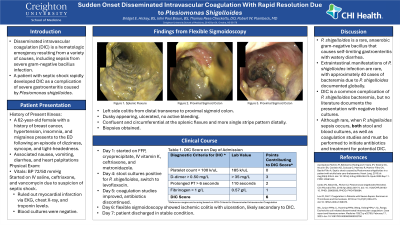Sunday Poster Session
Category: GI Bleeding
P0809 - Sudden Onset Disseminated Intravascular Coagulation With Rapid Resolution Due to Plesiomonas Shigelloides
Sunday, October 27, 2024
3:30 PM - 7:00 PM ET
Location: Exhibit Hall E

Has Audio
- BH
Bridget Hickey, BS
Creighton University School of Medicine
Omaha, NE
Presenting Author(s)
Bridget Hickey, BS1, John Paul Braun, BS1, Rees Checketts, DO1, Robert W. Plambeck, MD2
1Creighton University School of Medicine, Omaha, NE; 2CHI Health Creighton University Medical Center, Omaha, NE
Introduction: Disseminated intravascular coagulation (DIC) is a hematologic emergency resulting from a variety of causes, including sepsis from severe gram-negative bacillus infection. We describe a case of a patient with septic shock who rapidly developed DIC as a complication of severe gastroenteritis caused by Plesiomonas shigelloides.
Case Description/Methods: A 62-year-old female with a history of breast cancer, hypertension, insomnia, and migraines presented to the ED following an episode of dizziness, syncope, and light-headedness, with nausea, vomiting, diarrhea, and heart palpitations. Physical examination revealed severe hypotension, with a blood pressure of 72/50 mmHg, and a systolic murmur. Septic shock was suspected, so IV saline, ceftriaxone, and vancomycin were administered, improving her blood pressure.
An EKG, chest x-ray, and troponin test ruled out myocardial infarction. A CT scan of the abdomen demonstrated a fluid-distended colon. Concurrent lab tests revealed leukocytosis, hypokalemia, an elevated INR and PT, lactic acidosis, and normal liver enzymes. Her clinical presentation and lab results were consistent with DIC, with a score of 6, indicating overt DIC requiring treatment (Table 1). She was transferred to the ICU in stable condition. The patient received FFP, cryoprecipitate, IV vitamin K, ceftriaxone, and metronidazole. Stool cultures were positive for P. shigelloides, prompting a switch to levofloxacin. Coagulation studies improved, and antibiotics were eventually discontinued. On day 5, a flexible sigmoidoscopy showed ischemic colitis with ulceration, likely secondary to DIC. The patient was discharged in stable condition on day 7.
Discussion: P. shigelloides is a rare anaerobic gram-negative bacillus commonly associated with untreated freshwater in developing countries. P. shigelloides infection typically causes self-limiting gastroenteritis with watery, non-bloody diarrhea. Extraintestinal manifestations of P. shigelloides infection are rare, with most cases occurring in immunocompromised patients. Bacteremia is the most common manifestation, however, only 40 or so cases of bacteremia due to P. shigelloides have been documented. Further research into the correlation of P. shigelloides infection and DIC is necessary to determine the occurrence rate of this phenomena. DIC is a common complication of P. shigelloides bacteremia, but the presentation rate in patients with negative blood cultures, like the patient in this case, is unknown.
Note: The table for this abstract can be viewed in the ePoster Gallery section of the ACG 2024 ePoster Site or in The American Journal of Gastroenterology's abstract supplement issue, both of which will be available starting October 27, 2024.
Disclosures:
Bridget Hickey, BS1, John Paul Braun, BS1, Rees Checketts, DO1, Robert W. Plambeck, MD2. P0809 - Sudden Onset Disseminated Intravascular Coagulation With Rapid Resolution Due to Plesiomonas Shigelloides, ACG 2024 Annual Scientific Meeting Abstracts. Philadelphia, PA: American College of Gastroenterology.
1Creighton University School of Medicine, Omaha, NE; 2CHI Health Creighton University Medical Center, Omaha, NE
Introduction: Disseminated intravascular coagulation (DIC) is a hematologic emergency resulting from a variety of causes, including sepsis from severe gram-negative bacillus infection. We describe a case of a patient with septic shock who rapidly developed DIC as a complication of severe gastroenteritis caused by Plesiomonas shigelloides.
Case Description/Methods: A 62-year-old female with a history of breast cancer, hypertension, insomnia, and migraines presented to the ED following an episode of dizziness, syncope, and light-headedness, with nausea, vomiting, diarrhea, and heart palpitations. Physical examination revealed severe hypotension, with a blood pressure of 72/50 mmHg, and a systolic murmur. Septic shock was suspected, so IV saline, ceftriaxone, and vancomycin were administered, improving her blood pressure.
An EKG, chest x-ray, and troponin test ruled out myocardial infarction. A CT scan of the abdomen demonstrated a fluid-distended colon. Concurrent lab tests revealed leukocytosis, hypokalemia, an elevated INR and PT, lactic acidosis, and normal liver enzymes. Her clinical presentation and lab results were consistent with DIC, with a score of 6, indicating overt DIC requiring treatment (Table 1). She was transferred to the ICU in stable condition. The patient received FFP, cryoprecipitate, IV vitamin K, ceftriaxone, and metronidazole. Stool cultures were positive for P. shigelloides, prompting a switch to levofloxacin. Coagulation studies improved, and antibiotics were eventually discontinued. On day 5, a flexible sigmoidoscopy showed ischemic colitis with ulceration, likely secondary to DIC. The patient was discharged in stable condition on day 7.
Discussion: P. shigelloides is a rare anaerobic gram-negative bacillus commonly associated with untreated freshwater in developing countries. P. shigelloides infection typically causes self-limiting gastroenteritis with watery, non-bloody diarrhea. Extraintestinal manifestations of P. shigelloides infection are rare, with most cases occurring in immunocompromised patients. Bacteremia is the most common manifestation, however, only 40 or so cases of bacteremia due to P. shigelloides have been documented. Further research into the correlation of P. shigelloides infection and DIC is necessary to determine the occurrence rate of this phenomena. DIC is a common complication of P. shigelloides bacteremia, but the presentation rate in patients with negative blood cultures, like the patient in this case, is unknown.
Note: The table for this abstract can be viewed in the ePoster Gallery section of the ACG 2024 ePoster Site or in The American Journal of Gastroenterology's abstract supplement issue, both of which will be available starting October 27, 2024.
Disclosures:
Bridget Hickey indicated no relevant financial relationships.
John Paul Braun indicated no relevant financial relationships.
Rees Checketts indicated no relevant financial relationships.
Robert Plambeck indicated no relevant financial relationships.
Bridget Hickey, BS1, John Paul Braun, BS1, Rees Checketts, DO1, Robert W. Plambeck, MD2. P0809 - Sudden Onset Disseminated Intravascular Coagulation With Rapid Resolution Due to Plesiomonas Shigelloides, ACG 2024 Annual Scientific Meeting Abstracts. Philadelphia, PA: American College of Gastroenterology.
